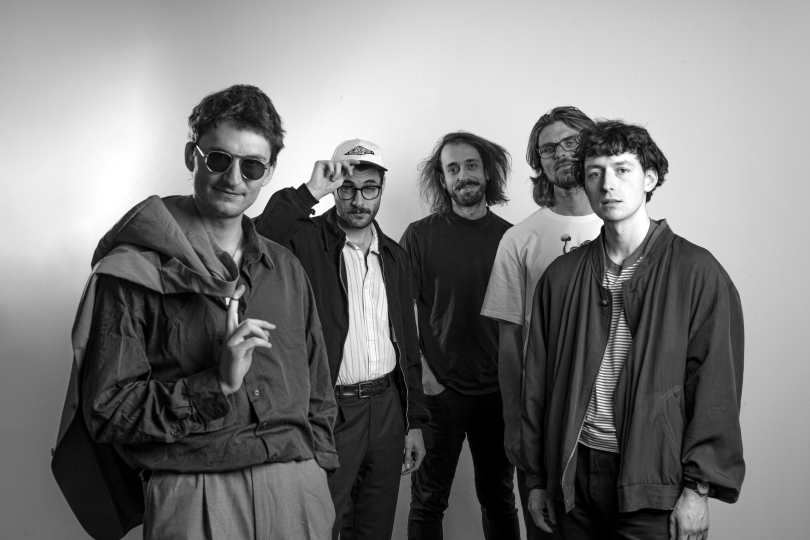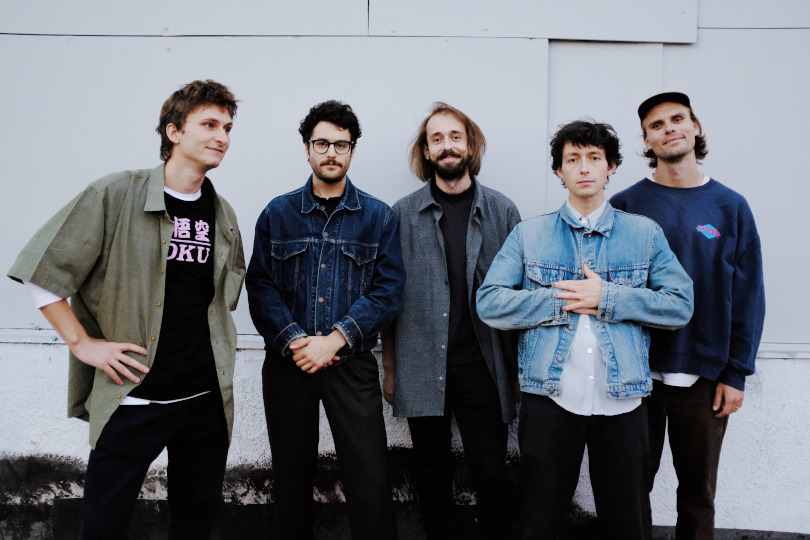
Matyáš Adámek (Island Mint): I Have a Strong Desire to Create Beautiful Things
Mesmerizing, sun-drenched and heartwarming – these words were used to describe the winners of the latest edition of the Radio Wave’s Czeching Contest – Island Mint. However, on their latest EP All Studium No Punctum, the band took a sharper, krautrock direction. The colourful palette of sounds has been extended even further in their new single "Burnout". The five-piece band led by talented frontman Matyáš Adámek, who also works as a sound designer for the Czech Olympic Team, is in fantastic shape. I interviewed him just a few days before their dress rehearsal at Eurosonic Noorderslag.
As I immersed myself in Island Mint songs, I was transported back to my childhood, when I used to listen to Beatles or Pink Floyd records on my father's tape deck. But at the same time, I also felt a kind of bittersweet, believable presence and joy. What were your musical beginnings?
I experienced something similar too, but a little later. I didn't get into music through my parents but through my friends from high school. My dad does play guitar, but my parents aren't that into music, we didn't have that kind of geekiness in the family. But my dad loved listening to the singer-songwriter Karel Plíhal. He was a big influence on me, I think.
Did you start learning guitar because of him?
I started playing it when I was five, but I only took lessons now and then. I don't have a classical music background and I don't know any theory. Anyway, the real thing started happening in high school when a friend and I put together a band called Humdrum Lighthouse. It taught me a lot back then. I started collaborating with other people and I realised how subjective music and its creation is. How everyone is looking for something different in it.
After a semester in Brighton, UK, where you studied with Joe Watson from Stereolab, you spent a year in Berlin studying music production. How did this experience shape you?
Studying changed my perspective on music a lot. Music is not just one single thing. In Berlin, I met a lot of people from different parts of the world and everyone approached music in a completely different way. I realised that music is like life, that everyone has a different way of doing it, coming from a different place and having a completely different goal in it, doing it for a different reason and with a completely different motivation. Within the same scene – and if you're in one place for a long time – you run into people who have pretty similar mindsets. Berlin completely shattered that idea of music for me.
You spoke about the therapeutic effect of making music. Obviously, you don't write songs just for that reason.
I have a bit of a problem writing about anything relevant to everyday life. But I feel a certain irrational desire to keep doing it. An inner desire to make more songs. But at the same time, I don't need to shout out that something's bothering me inside. I just have a very strong desire to make beautiful things. It seems like the most meaningful use of my time.
You have recently released a new single with Island Mint called "Burnout". Is this song somehow related to the omnipresent topic of burnout, or does it refer to something else?
In this song, we took something that I've been cultivating for a long time to the extreme – the fusion of opposites and contrasting principles. After all, our music is often somewhat bittersweet. That kind of feeling or atmosphere fascinates me. And this song in particular is about a love relationship, but the whole story takes place against the backdrop of the end of the world. It's an apocalyptic love story based on the contrast between the themes of romantic intoxication and overwhelming transience.
Let's go back to Berlin for a moment. Did you meet anyone really interesting during your studies?
There were several inspiring people among the teachers there, like Tim Gowdi, who produced Suuns. And I also became friends with two young Slovak producers, David Krajčík and Sam Benko. Both are extremely talented and technically proficient.
As a producer, you are starting to establish yourself. Apart from the new single, you've produced your current EP All Studium No Punctum. Do you feel confident in this role?
I learned some things in Berlin, some things before that. Gradually, I gained more confidence to venture into the field. I used to believe that the mixing and production just had to be perfect, that it was extremely technically demanding and you needed an awful lot of experience. But I met people who convinced me that everything is just a matter of taste and that everyone does it differently. And that I can take my chances.
You mainly write the songs yourself, so you can work on and develop individual themes and ideas for a long time. But you've changed the recording location. This time you didn't record in a cottage or a basement, but in Andel Sound studio.
Our keyboard player Honza recorded an album at Eric Stevenson's place with his band Cold Meat Party and I co-produced it. When we got the assignment from Radio Wave to do a single after winning Czeching, it was an obvious choice. And we really enjoyed it – finding the sound is the ultimate fun!
Did you discover something new in terms of gear and its possibilities thanks to this experience?
We tried a lot of different combinations, which I enjoyed extremely. But ultimately, this job is about something else. A good producer doesn't spend four hours experimenting with different box setups. He already knows the boxes and knows which one he's going to use. We enjoyed hybrid recording – drums and bass completely recorded to tape, which I love. I'd like to record the whole album analogue one day. We also used a lot of Roland's Space Echo, which is actually a tape effect as well. On the "Burnout" track, I have a sort of shifted vocal. I sang it half a note lower and then we digitally moved it half a note higher again. That's something I've always really wanted to try.
You're playing at Eurosonic soon. How much are you preparing for it?
Recently, thanks to Radio Wave, we were in Budapest at the BUSH showcase festival and conference. And it was a great experience. We met a lot of people there and planned a lot of meetings for Groningen. We also got a lot of contacts for our planned autumn tour in the Balkans. And we rehearsed a 40-minute set, which we will test twice before Eurosonic.
What else are you doing to succeed in Groningen?
We're working on it with our manager and booker. We've talked to a number of people about how to approach the showcase. And we've put together a set that's 40 minutes long (no delays and no stops) where everything just flows dynamically. The songs follow each other seamlessly and everyone, including the sound guy and lighting girl, knows exactly what to do at every moment. Everything should be synchronised into one cohesive whole. We want to work hard at Eurosonic to make it worthwhile. And I realise it would be much more difficult without a manager. There are a lot of things that you can't forget and have to keep an eye on, from arranging meetings to the band's image, social networks or streaming platforms.
The most important thing might be whether you will be able to transmit the joy I feel from your work and your playing to the audience.
In one of my first interviews, I said that the Czech scene is unnecessarily depressing. Today when I read it, I think it's stupid.
You don't think so anymore?
Yes, but it's a bit pointless to say that. I'm only mentioning it again now because I want music to make me happy. I really want it to be fun first and foremost. And if it's not fun, it's just not worth it and I don't want to do it.
Is that your main motivation, to experience the joy of making music?
Of course, there is a deeper meaning behind it as well. But first and foremost, if you spend so much time doing it, it should be fun.

Finally, I would like to ask you about your guitar equipment. What do you prefer at the moment?
I used to have a bit of a Beatles period and I bought an Epiphone Casino. It's great and actually the only guitar I'm able to really play now. I've always played Fenders, I've had a Jaguar and a Telecaster. But when I bought the Casino, the guitar suddenly started playing a completely different role in the mix. And I also bought a great Höfner – a bass model that Paul McCartney played. That's also one of my favourite instruments. Even though it's not really designed for the studio, it doesn't resonate that well and it's not in great condition, I record a lot of demos on it and I love the sound of it.
And the pedalboard?
Until recently I used to travel with a big pedalboard and I had a lot of stuff in it. On the last tour, I had two guitars too, another Strat. I thought the songs would sound just like the mix. But then I got tangled up in the cables on stage and it took me two minutes to rearrange between songs. And now before Eurosonic, it was a good opportunity to change my approach. So I've reduced my pedalboard by half. I just have a tiny case and one guitar. I've completely stopped worrying about it and I'm concentrating on singing well.
Your debut Irreality is connected with the story about the moss imported from Uppsala, Sweden, which you used in the video and at the launch. Will you continue to work with similar personal symbols?
The album has been very intense for me, I've immersed myself in it a lot. It was still half COVID, I had the space to think about everything conceptually. But even now I want my music to be able to say what was really on my mind. Not to make music that people would want to hear but that I would find distant, I want my music to say what I really want to say.
That's no small claim...
The trap is that if you take it too personally, you can associate your own value with the music. And that used to happen to me a lot. Nowadays – and it's probably my work as a sound designer for the Czech Olympic team that has trained me a lot – I'm able to do something that doesn't concern me personally at all. And I'm not afraid to experiment and try things where I have no idea how they will turn out. I feel somehow lighter after all the experience. But around the time of Irreality, I was still pretty extreme in these things. I had a hard time even when the people I usually talk to about music didn't comment on the record. Then I realised that it's perfectly fine when someone isn't interested.
If you have found an error or typo in the article, please let us know by e-mail info@insounder.org.

